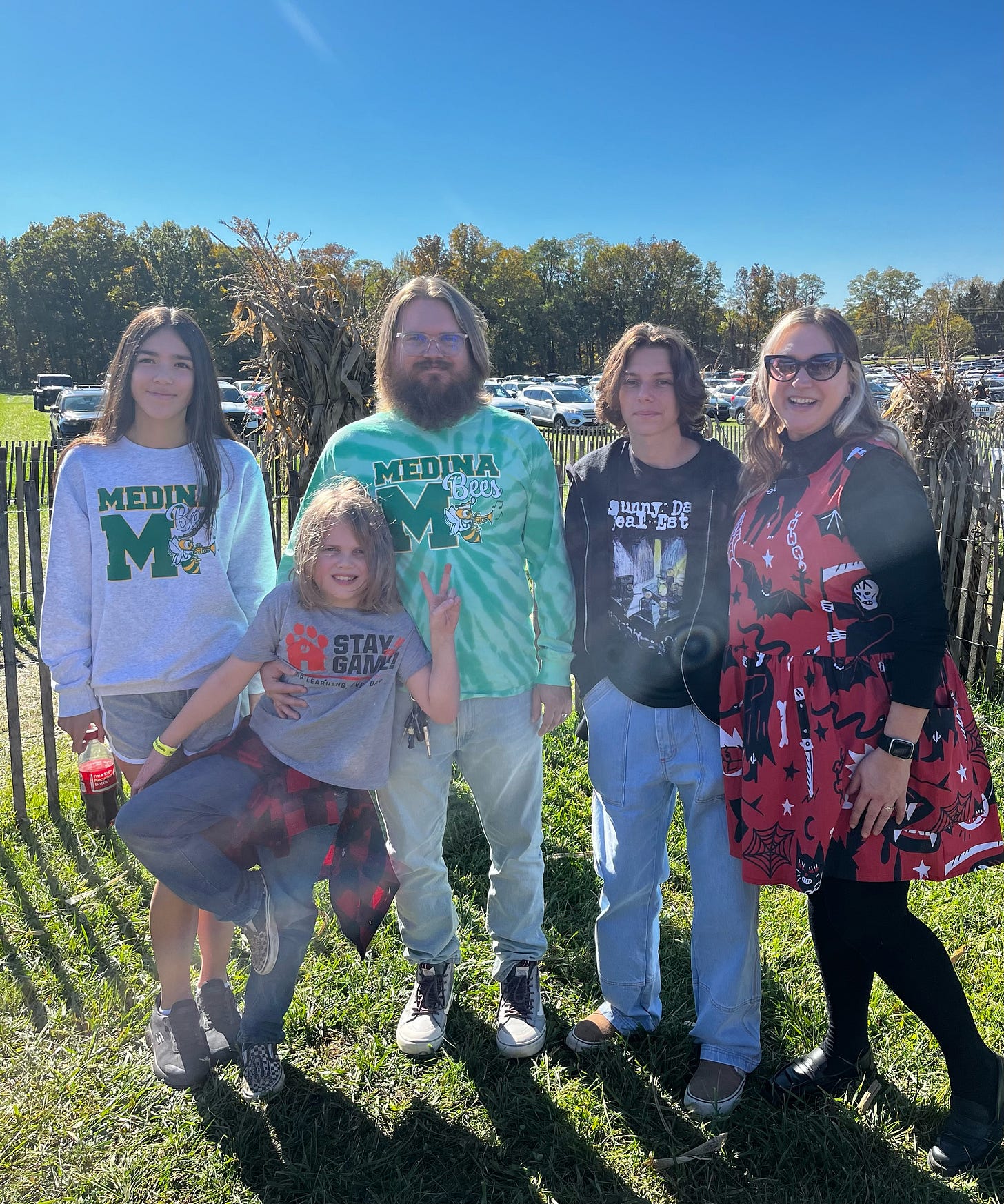That’s “Autistic” with a capital A, thank-you-very-much
Five things I wish I would’ve known when we got our first diagnosis
“I’m sorry.”
I’m always taken aback when I hear this response when I mention that my kids are Autistic. It’s usually a detail I mention to give context to a story I’m telling — just like mentioning someone is left-handed or allergic to tree nuts or colorblind or vegan or some other random thing that’s important but also not that big of a deal.
I’m not sorry my kids are Autistic. Sure, it was really confusing and overwhelming at first, but that was just because of a lack of education. Now that I know a lot more, it’s just a detail.
Over a decade ago, my son was diagnosed with Autism Spectrum Disorder. (I wish I could say that was back in the misinformation age when people thought vaccines caused Autism, but misinformation seems to have bigger and bigger teeth as the years go on…) I was a young, single mother going through an ugly custody battle, trying to start a new career and a better life.
People close to us told me what a “normal” kid H was and encouraged me to get a second opinion. In retrospect, going through the process all over again just delayed my own acceptance of the inevitable, but that’s the thing about acceptance: it’s a process, and everyone has their own hurdles along the way.
Since then, I’ve gotten married, become legal guardian to a daughter, had another child and processed another diagnosis, which has been a journey completely different than the first. Echoing Rod Stewart, there’s so much I know now that I didn’t then, but if I had to narrow it down, here are some things that would have brought some comfort to my former self:
1. Autism is a spectrum
Autism is known as a “spectrum” disorder because there is a wide range in the type and severity of symptoms people experience. What we now know as ASD, according to the DSM-5, was categorized as five different types of autism before 2013: autistic disorder, pervasive developmental disorder-not otherwise specified (PDD-NOS), Asperger syndrome, Childhood Disintegrative Disorder and Rett Syndrome. Experts moved toward a single diagnosis for this huge range of symptoms because research showed these categories were not reliably diagnosed.
Some people have severe deficits in verbal and nonverbal social communication skills and require substantial support from caregivers throughout their entire lives. Many can live independent, successful lives with some extra support for social and emotional goals.
I have two children with this diagnosis, and they display completely different symptoms. As Stephen Shore, a doctor of education and clinical assistant professor at Adelphi University’s College of Education and Health Sciences in New York puts it: “When you've met one person on the Autism spectrum, you've met one person on the Autism spectrum.”
2. Your disability is not your identity, but it can be if you want it to be.
Another special needs parent sold me on the idea of “Person-First Language”: this idea that a person “has Autism” rather than “is Autistic” and how the language used to describe them should reflect them as a whole person rather than identify them by their disability. This trend was really popular among parents, educators, and advocates at the time, and I could see they had good intentions.
But here’s the thing: Autism isn’t something to be ashamed of — it’s something that needs to be normalized, especially considering how much more often it is being diagnosed than in previous generations.
Insisting on language such as “person with ASD” over “Autistic person” denies the child the right to include Autism as part of their identity. On the other hand, insisting on identity-first language assumes the disability is part of their identity. The crux of the problem is that we’re talking about children. They are the ones who will ultimately decide on their identity, but that takes time.
In my hurried enthusiasm to educate others, I made the cardinal sin of accidentally “outing” my oldest when he was on the cusp of graduating elementary school. I use that language because OF COURSE I would never out anyone who trusted me with sensitive information about their gender or sexual identity on their journey to self-actualization. I’m still so embarrassed that I didn’t think to ask him about his preferences and boundaries. He was mortified that other people — particularly some of his peers — knew about his diagnosis, while I saw it as a protection for him and an explanation of why he might not pick up on every social cue. Years later, although he certainly isn’t shouting about his diagnosis from the rooftops, he does occasionally post a meme from the Autie community.
One thing is for sure: the split about this in the Autistic community (see what I did there?) demonstrates that parents prefer person-first language, and self-advocates prefer to identify as Autistic. Just like with pronouns or other identifying markers (LGBTQ+, Black, Deaf, Latinx, etc.), it’s always best to ask a person their preference, including capitalizing that A.
3. Remember the power of positive parenting
Family life can be so hectic that it’s easy to forget that on top of caring for your children, you’re also supposed to be parenting them and setting an example. My husband and I were fortunate to be able to go through the Triple P program through Akron Children’s Hospital when H was a frustrated preschooler throwing temper tantrums. We sat with a therapist every other week and discussed “parenting traps” that were so easy to fall into. We learned how to implement time-outs, and we reminded ourselves to tell H what he should be doing instead of yelling at him to stop. We gave specific and genuine praise for good behaviors, and we learned what negative behaviors to ignore. It was tough, but it created mindful habits that have benefited not just my home life but have had a positive effect on basically every aspect of my life.
4. Doctors are not infallible, but they give really good advice that is based on research
The first developmental pediatrician we were referred to told me: “Don’t let anyone tell you he has Autism. He’s got great eye contact!” I took this as gospel truth, and it wasn’t until a third opinion confirming a second opinion did I begin my journey to acceptance, understanding and pride.
Looking back, I’m embarrassed about my denial of H’s diagnosis all those years ago. It’s silly that I was embarrassed about my kid not being “normal” or having “special needs.” Most of the things I love about him most are directly tied to his Autism: his creativity, his sincerity, his honesty.
According to the Centers for Disease Control & Prevention (CDC), Autism affects an estimated 1 in 44 children in the United States today — up from 1 in 125 just 20 years ago. Does this mean more people are Autistic now? Probably not, but more people are diagnosed with Autism, which is a good thing. Early detection and intervention produce better outcomes.
5. H is doing just fine
Being sent home from the Cleveland Clinic with a mountain of paperwork and treatment recommendations that I’d never be able to afford made me feel like I already failed my child. If I could’ve time-traveled to meet the sweet, intelligent, thoughtful big brother that he’s turned out to be today, all that anxiety would have washed away.
He graduated from his IEP (Individual Education Plan) just before entering high school. Although I was nervous about giving up all the extra supports that came with that contract, he’s had no problems keeping up with his peers academically, which gives me faith that my younger son’s IEP team will do what’s best for him and keep me in the loop with those decisions.
Sure, there are struggles, but parenting is always hard whether your children are neurotypical or not. I was pretty sure that he would never learn how to read (the English teacher’s son — illiterate! — how embarrassing!), but one day it just clicked. Because of his IEP, he was exempted from the State’s Third Grade Reading Assessment, but he had the confidence to take it anyway — and he passed.
He’s grown in so many ways beyond academics. He’s a brilliant musician who can play any style on guitar and drum kit, and he has a robust knowledge of rock ‘n’ roll history — particularly the DC hardcore scene and waves of Midwest emo that followed. (Proud also-a-music-nerd mom over here!)
I realize as I read over this how many times I say that I’m embarrassed for my missteps, but I’m also really grateful for them. Just like our children, we as parents have the ability and responsibility to continue to grow.
hellraisers is written for parents by parents. Interested in becoming a writer? Send us a message. We’d love to share your story.






